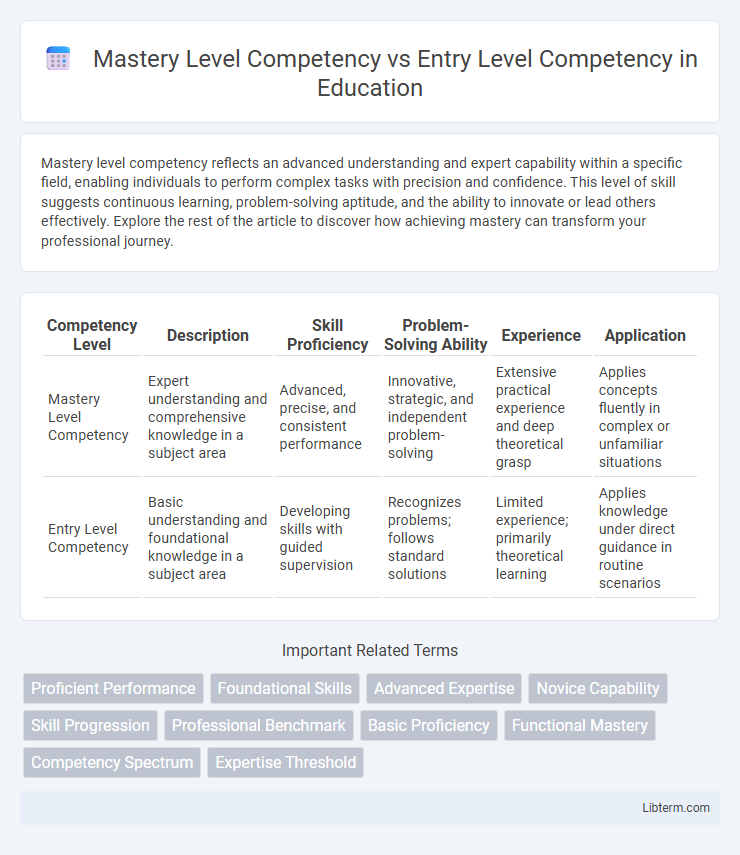Mastery level competency reflects an advanced understanding and expert capability within a specific field, enabling individuals to perform complex tasks with precision and confidence. This level of skill suggests continuous learning, problem-solving aptitude, and the ability to innovate or lead others effectively. Explore the rest of the article to discover how achieving mastery can transform your professional journey.
Table of Comparison
| Competency Level | Description | Skill Proficiency | Problem-Solving Ability | Experience | Application |
|---|---|---|---|---|---|
| Mastery Level Competency | Expert understanding and comprehensive knowledge in a subject area | Advanced, precise, and consistent performance | Innovative, strategic, and independent problem-solving | Extensive practical experience and deep theoretical grasp | Applies concepts fluently in complex or unfamiliar situations |
| Entry Level Competency | Basic understanding and foundational knowledge in a subject area | Developing skills with guided supervision | Recognizes problems; follows standard solutions | Limited experience; primarily theoretical learning | Applies knowledge under direct guidance in routine scenarios |
Defining Mastery Level Competency
Mastery Level Competency represents an advanced proficiency where individuals demonstrate deep expertise, consistently deliver high-quality results, and can mentor others in complex tasks. This competency level involves applying knowledge creatively and strategically to solve problems beyond standard procedures. It contrasts with Entry Level Competency, which entails fundamental skills and basic understanding necessary to perform routine tasks under supervision.
Understanding Entry Level Competency
Entry Level Competency represents foundational skills and basic knowledge necessary for job performance, emphasizing the ability to execute routine tasks under supervision. Individuals at this level demonstrate practical understanding but require guidance to navigate complex problems or adapt to dynamic work environments. Mastery Level Competency, by contrast, reflects advanced expertise, independent problem-solving, and strategic decision-making capabilities built upon the Entry Level foundation.
Key Differences Between Mastery and Entry Levels
Mastery level competency demonstrates an advanced understanding and ability to apply complex concepts independently, while entry level competency reflects basic knowledge and skills sufficient for initial task performance. Mastery involves critical thinking, problem-solving, and consistent high-quality results, whereas entry level focuses on learning procedures and following instructions under supervision. The key difference lies in depth of expertise, autonomy, and the capacity to innovate versus foundational proficiency and guided execution.
The Importance of Competency Frameworks
Competency frameworks play a crucial role in distinguishing mastery level competency from entry level competency by clearly defining the skills, knowledge, and behaviors required for each stage. They provide structured benchmarks for employee development, enabling organizations to align training programs with specific performance expectations and career progression paths. This systematic approach helps in measuring proficiency accurately, guiding recruitment, and fostering continuous improvement in workforce capabilities.
Skill Depth: Mastery vs Entry Point
Mastery level competency demonstrates deep skill depth characterized by advanced knowledge, refined techniques, and the ability to solve complex problems independently. Entry level competency reflects foundational skill understanding, basic task execution, and reliance on guidance or structured training. Skill depth at mastery involves comprehensive domain expertise, while entry level marks the starting point for skill development.
Real-World Examples of Each Competency Level
Mastery level competency demonstrates advanced skills and deep understanding, such as a software engineer designing complex algorithms that optimize performance in large-scale systems. Entry level competency involves foundational knowledge and basic task execution, like an intern writing simple code snippets under supervision to support software development. These real-world examples highlight the gap between expert problem-solving abilities and initial learning-stage capabilities in professional settings.
Pathways to Progression: Moving from Entry to Mastery
Entry level competency represents foundational skills and basic knowledge required to perform tasks effectively, while mastery level competency embodies advanced expertise, deep understanding, and refined abilities in a specific domain. Progression pathways involve continuous learning through targeted training, real-world experience, mentorship, and iterative skill application to bridge the gap between entry and mastery. Structured development plans, regular performance assessments, and goal-oriented feedback accelerate the transition from novice proficiency to expert-level command.
Assessment and Evaluation Methods
Assessment methods for Mastery Level Competency emphasize performance-based evaluations, such as simulations, project completions, and real-world problem-solving tasks, to demonstrate in-depth knowledge and skill application. Entry Level Competency assessments often rely on standardized tests, quizzes, and foundational knowledge checks to verify basic understanding and initial skill acquisition. Evaluation techniques for mastery include qualitative feedback, peer reviews, and continuous performance tracking, whereas entry-level evaluations typically focus on objective scoring criteria and completion benchmarks.
Impact on Career Development and Opportunities
Mastery level competency demonstrates advanced skills and expertise that significantly enhance career development by opening leadership roles, specialized projects, and higher salary potentials. Entry level competency, while foundational, limits opportunities to basic tasks and requires further growth to access career advancement and professional recognition. Employers prioritize mastery competency for strategic positions, making it a crucial factor in long-term career progression and competitive advantage.
Strategies for Advancing Competency Levels
Mastery level competency requires targeted strategies such as deliberate practice, continuous feedback, and complex problem-solving to deepen skill proficiency beyond entry level. Entry level competency focuses on foundational knowledge acquisition and basic task execution through structured training and clear performance standards. Advancing between these levels involves progressively challenging tasks, mentorship, and reflective learning to bridge skill gaps and promote expertise development.
Mastery Level Competency Infographic

 libterm.com
libterm.com